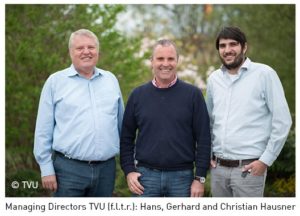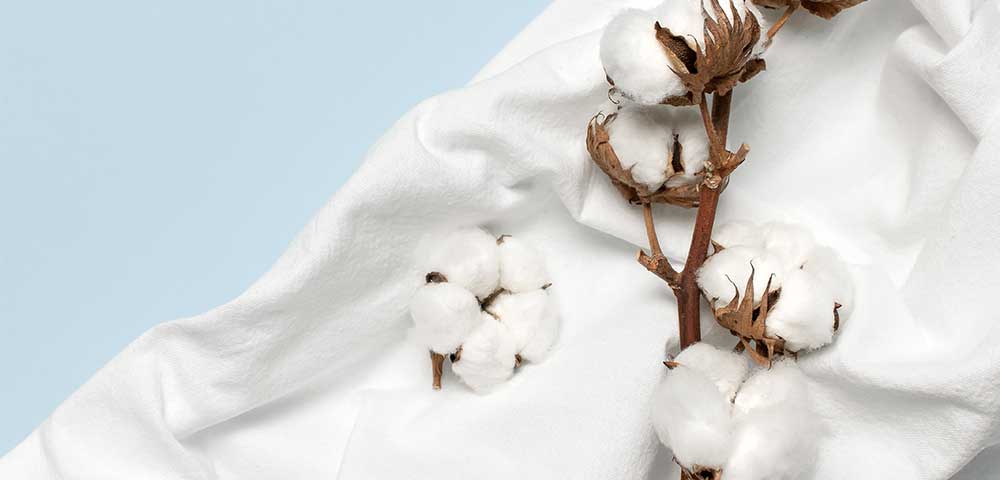Interview with Hans Hausner, TVU:
 With its high degree of international networking, but also because of its large know-how about consulting and products, the TVU Group is one of the leading yarn trading and finishing companies in Europe. The family company was founded in 1922 and is today run by the third and fourth owner generation. It convinces through values like reliability, service, quality and sustainability. Cotton plays a pivotal role in the product portfolio. The TVU is a member of the Association of the Bremen Cotton Exchange. The editorial staff of the Bremen Cotton Report talked to TVU´s co-owner Hans Hausner about the company from the Middle Franconian Leutershausen in the federal state Bavaria.
With its high degree of international networking, but also because of its large know-how about consulting and products, the TVU Group is one of the leading yarn trading and finishing companies in Europe. The family company was founded in 1922 and is today run by the third and fourth owner generation. It convinces through values like reliability, service, quality and sustainability. Cotton plays a pivotal role in the product portfolio. The TVU is a member of the Association of the Bremen Cotton Exchange. The editorial staff of the Bremen Cotton Report talked to TVU´s co-owner Hans Hausner about the company from the Middle Franconian Leutershausen in the federal state Bavaria.
How is the TVU Group structured today?
Hans Hausner: We are a traditional, clearly structured and market and future oriented family company. Apart from me, my brother Gerhard Hausner and my son Christian Hausner manage the business. Our two main pillars in Leutershausen are the TVU Textilveredelungsunion with 130 employees and a production volume of about 4,500 tons a year and the TVU Garnvertrieb with an annual trading volume of about 10,500 tons of yarn and 20 employees. In addition to Leutershausen, we have selling agencies in the Czech Republic, Hungary and Slovenia. There is also the Ascentex Exim LLP in Singapur which we founded together with a partner in 2010. The share of exports in the TVU Group´s total sales at the sum of 47 million Euro 2015/16 amounts to almost 44 percent these days.
How is the TVU Garnvertrieb structured?
The special fields of the TVU Garnvertrieb are clearly cotton yarns and mixtures in cotton/polyester and cotton/acryl. We acquire raw materials in, among others, Spain, Greece, Turkey, Tunisia, Egypt, Ivory Coast, India, China, Vietnam or Indonesia. In part, we produce our own cotton yarns with continual quality controls. Here, we have been working together with established producers and spinning mills for many years.
We work very service-oriented and have stocks of 3,500 tons available in Leutershausen as well as a warehouse near the harbour in Bremen. This way, we can supply all of Europe easily and quickly. Among our customers are weaving mills and, knitting mills of all textile segments that deliver their products to downstream steps, as well as wholesalers.
The Ascentex Exim LLP, Singapur, in which we hold a participation, organises the yarn trade on an international level. With it, we provide for Brazil and Mexico as main markets in South America. Thanks to the Ascentex Exim network, we also profit in the sourcing of yarns in Asia.
Where are your yarns utilised?
Our yarns are mainly manufactured into home and house textiles, upholstery fabrics, technical textiles, but also into medicine products like gauze and bandages or sanitary products. A great share also goes to knitting mills and to fabric production for fashion and clothing.
In your opinion, how important is the quality of the raw cotton material for the result of your work?
Generally, we put high requirements on the quality of our products. For the result of our dying the constant quality of cotton in yarns is of pivotal importance. Essential for the colouring and the processing are especially the uniform maturity level of the cotton and for the finishing the tenacity of the fibres. Quality features in the yarn trade are fibre fineness, fibre length and fibre regularity. The knowledge about the features and quality attributes of cotton is a prerequisite for our quality production and for a professional product counselling for our customers. To clarify quality matters in the field of cotton, we also like to use the expertise of the Bremen Cotton Exchange.
What treatments do you use in dye-works and finishing? What do customers appreciate?
In the field of the cross bobbin dyeing we employ, the TVU Textilveredelungsunion is market leader in Germany. The daily capacity is 30 tons. We have 100,000 colour formulations, and colours are mixed automatically. The checking is based on newest colour measuring methods. We offer an additional value through fast-forwarding and rewinding, waxing and electronic cleaning as well as special finishing for medical and technical applications. The TVU is the point of contact on the subject of yarn finishing for the field of bandaging material and hygiene: e. g. bandaging material bleach or e. g. the hydrophobing of tampon retrieving threads.
We also pull together with our customers on the subject of special purposes of application and product requirements. Our anti-aging special finishing with vitamin E, aloe vera and jojoba oil especially comes into effect in underwear, bedclothes etc. – just everywhere that textiles are in close contact to the body and are often washed or bleached.
Furthermore, we are open to ideas for finishing that we can test and realise individually and exclusively together with our customers in our international network with the future in sight.
What is your understanding of sustainable and socially responsible production?
With our vision 2020, we have set ourselves engaged sustainability aims as early as 2010. The management and all employees work towards their realisation every day. Heat is generated in a biomass heating plant. After dyeing, we have recovered 60 percent of the heat. 13 percent of the power demand are covered by photovoltaic systems. This makes for a more than 90 percent reduction of CO2. We use dye stuffs, chemicals and all raw materials economically. As a result, our amounts of waste and drain water are reduced to the minimum. We exclusively use raw water. Process optimisations have led to a reduction of 35 percent of water usage. We have our own waste water discoloration through partial current treatment even before the local sewage plant. Our extensive and long-term waste water and waste statistic is accessible for customers and authorities.
In Germany, the compliance to social standards is self-evident. This is controlled legally. We measure our suppliers according to our demands and personally check the social standards on site. We are a member in the Partnership for Sustainable Textiles with the aim of improving the social, ecological and economic conditions along the textile supply chain. From conviction, we do not use environmental toxins that accumulate in nature and are not decomposable. Reach regulations, Oeko-Tex standards and legal regulations present a minimum entitlement that, with regard to our responsibility for following generations, we demand of ourselves and partly even surpass.
What role do seals play in your opinion as verification of sustainable work?
Many labels and quality seals convey the accordance to sustainability and social criteria we meet anyway because of our ethical self-understanding, economical reasons and legal regulations. After all, there are permanent investments into plants and procedures in order to work more accurately, productively and environmentally friendly. With ISO 9901, we command a controlled quality management. Furthermore, we work according to the norm ISO 14001 in our environmental management. All products have an Oeko-Tex standard 100 per se. Should customers so wish, we provide product series that are certified according to the Global Organic Standard GOTS, Fairtrade and the extremely strict standard IVN Best of the Naturtextilverband. So far, though, such projects amount to only five percent of our volume of sales.
What advantages does the duo of yarn trading and yarn finishing offer for the TVU?
The advantages are obvious: by bundling the competences in yarn trading and yarn finishing, almost every value-added chain is in our hand.
Thank you very much for the interview!
Interviews embody the opinion of the respective interview partner and do not represent the position of the Bremen Cotton Exchange as neutral, independent institution.

